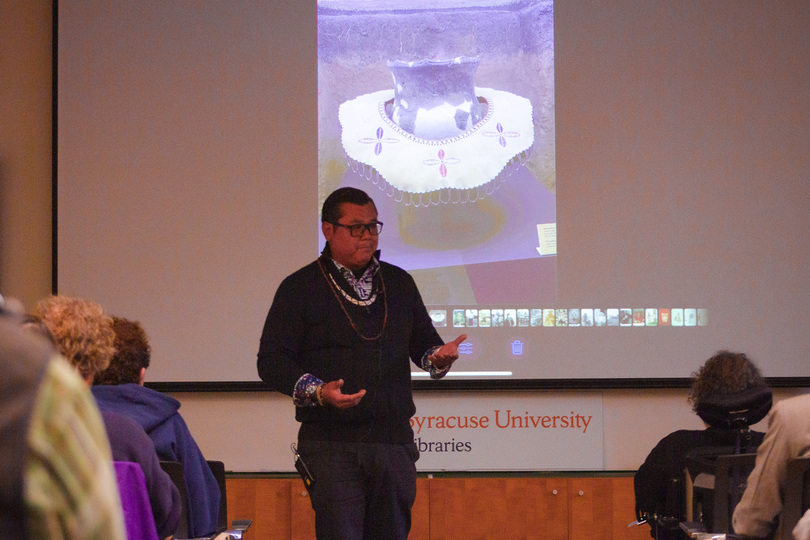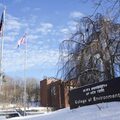Jamie Jacobs shares stories, traditions in Listen to the Elders Speaker Series

Jacobs highlighted oral histories that are usually unrepresented, despite being crucial to sharing skills and stories in Indigenous cultures. He also shared Indigenous artifacts including pots, baskets and rope binds, emphasizing the ritual process in making the items. Sean Sterling | Staff Photographer
Get the latest Syracuse news delivered right to your inbox.
Subscribe to our newsletter here.
Jamie Jacobs left the Tonawanda community where he was raised in the 1990s to pursue the “American dream” by moving across the country to attend college in Arizona. But he returned to his community after college when he realized his true dream was to perpetuate the preservation and survival of the Tonawanda community and its culture.
Today, Jacobs, a member of the Turtle Clan of the Seneca people, is a managing curator of the Rock Foundation collections at the Rochester Museum and Science Center, where he’s worked for two decades.
As students and faculty ate traditional corn soup, Jacobs spoke on the importance of oral histories Monday as part of the Listen to the Elders Speaker Series in Syracuse University’s Bird Library. During his presentation, Jacobs shared his experiences working as a managing curator of the museum and the stories of his Tonawandan ancestors.
“I’ve read scholarly interpretations of our culture, and a lot of times they do touch on important things that we do talk about within the community, but they usually come to their own opinion about our culture, whereas I’ve actually lived the factual part of that,” Jacobs said. “So it’s not to say that they’re wrong, but to put the two together, it gives you a really good broad picture of who we are and where we’ve been and our history.”
Sponsored by SU’s on-campus collective, Not in the Books, the series invites Indigenous knowledge keepers to present history not found in textbooks.
Jacobs said oral histories are typically left unrepresented in formal textbooks even though they are crucial in sharing traditions, skills and stories from Indigenous cultures. He said it’s essential for elders to pass down these oral histories through their lineages, especially in the face of colonization and discrimination.
“We’re very proud to present Jamie Jacobs as a ceremonial custodian of the Longhouse Seneca,” Jim O’Connor, SU’s executive director of Middle East Advancement and External Affairs and a member of the Not in the Books team, said. “He’s one of the last Seneca speakers in the community, and helped to establish the Tonawanda language program to ensure preservation of the language.”
Pointing to the Tonawanda community where he was raised, Jacobs said the chief and clan mother system had a notable impact on him and allowed oral histories to be relayed easily.
“Our ancestors definitely had the intelligence to come up with a written system of our language and history, but they decided to do it through oration and generational knowledge, and then transfer of knowledge from person to person,” Jacobs said. “You don’t just learn from the person, but you learn who they are deep down, you learn the experiences they’ve had in life, and that adds to the cultural knowledge as well.”
During his presentation, Jacobs also shared various Indigenous artifacts from the Seneca. Showing pots, baskets and rope binds, he said the ritual processes of making these items extend beyond a merely utilitarian purpose.
He said the ritual processes in creating these items not only teach an ancestral skill, but also stories, values and community bonding essential for the Indigenous community. He brought up the example of how young women in the community learn about cultural history through making clay pots.
“She’s learning about family history, she’s learning about why the generation who came before her were so important, why you value them for who they are and that you have love, compassion, you have understanding,” Jacobs said.
The Not in the Books collective, which started the Listen to the Elders Speaker Series in 2022, was founded by Diane Schenandoah, an Oneida Nation Faith Keeper and SU’s Honwadiyenawa’sek, or “one who helps them.”
In creating the series, Schenandoah looked to fill a knowledge gap she noticed many students had regarding the impacts of colonialism and the dispossession of Indigenous lands. Initially bringing in only Haudenosaunee tribal elders, the series has since covered a multitude of lenses, from Indigenous traditions to governance.
“As Indigenous people, our history is so erased,” Schenandoah said in a June 2024 press release about the series. “Many students see the purple and white flag flying around campus but don’t really know what it is. You’re standing in the capital of the Haudenosaunee Confederacy. This is the birthplace of democracy.”
As part of his job as the managing curator of a museum, Jacobs said he aims to educate people about Indigenous culture. He possesses the knowledge required to officiate traditional funerals, weddings and other ceremonies. He practices traditional art taught to him by elders and researches ancestral construction techniques.
Jacobs also speaks the Seneca language, a dwindling skill in his community, he said. He never formally attended language school, but said he learned from speaking with his great-grandmother, demonstrating the importance of oral and familial teaching.
“Learning language, you really get a sense of how our ancestors thought about the world they lived in,” Jacobs said. “And even still, today, it’s very important to maintain that way of thinking.”
Jacobs also discussed significant events in his community’s past, such as the War of 1812 and Jesuit recordings of the Seneca language. He explained his family’s involvement in historic events and the impact these personal experiences have had on his life.
By sharing the faces and individual stories behind these periods of history, Jacobs said he hopes to add depth to the way Indigenous communities are portrayed.
“We’re trying to peel away the layers of atrocities and boarding schools to try and reclaim things that were lost or the attempted eradication of our culture,” Jacobs said. “Right now, we’re actually using oral tradition and blending it with modern technology to reclaim and kind of reinstitute this way of thinking to our younger generation.”





